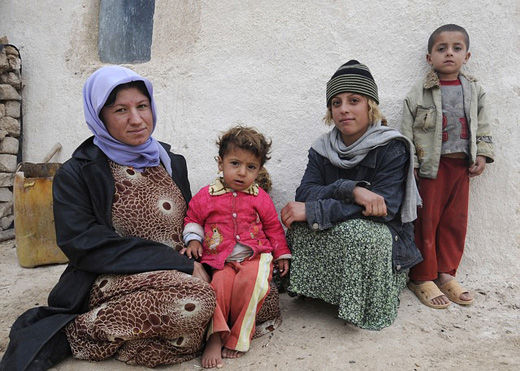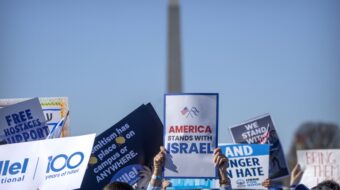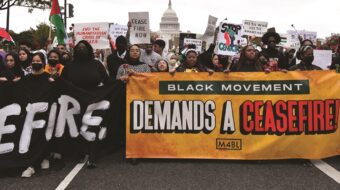
Right-wingers like Dick Cheney have lost no time in using Iraq’s crisis to attack President Obama’s effort to move away from militarism. Cheney, Sen. John McCain, and other architects and advocates of the disastrous U.S. invasion and occupation of Iraq, are calling for U.S. military intervention, not only in Iraq but in Syria and elsewhere. They claim such “U.S. leadership” is indispensable around the world.
This week, Cheney and his daughter Liz announced formation of an Alliance for a Strong America to “advocate for the policies needed to restore American power and preeminence.”
(Note: At the time Cheney left office, just 30 percent of Americans in ABC/Post polling approved of his job performance as vice president. Twice as many, 60 percent, disapproved.)
Some influential centrists are also using the occasion to push for U.S. military action in both Iraq and Syria. For example, Anne-Marie Slaughter, head of the neo-liberal New America Foundation, says “we should attack … in both Iraq and Syria.” Slaughter was director of policy planning at the State Department from 2009 to 2011. The U.S., she says, should “simultaneously” take action against the extremists terrorizing Iraq under the name of ISIS, “and the [Syrian] government.” She declares, “We must use force as part of a larger political strategy,” which in her view includes bypassing the United Nations in the name of “humanitarian” intervention.
On Thursday, Obama announced he was sending “a small number – up to 300” military advisers to Iraq, and beefing up U.S. intelligence operations there. He also said he “will be prepared to take targeted and precise military action if and when we determine that the situation on the ground requires it.”
The term “advisers” immediately evoked a negative response among Americans who recall how U.S. “advisers” morphed into the all-out U.S. war in Vietnam, costing more than 50,000 U.S. lives, not to mention hundreds of thousands of Vietnamese. Polls show the U.S. public overwhelmingly opposes U.S. intervention in Iraq, especially sending in ground troops, with more support for air or drone strikes if requested by Iraq’s government. Pentagon Joint Chiefs of Staff chair Gen. Martin Dempsey warned this week that air strikes would be very difficult to target and would risk incurring civilian casualties.
Obama emphasized Thursday that there would be no U.S. “boots on the ground” in Iraq. In an echo of his argument for a less militarized foreign policy – stated recently in his West Point commencement address – he said, “What’s clear from the last decade is the need for the United States to ask hard questions before we take action abroad, particularly military action.”
Among those hard questions, many Iraqis believe, should be a serious re-think of the damaging U.S. policy of manipulating ethnic and sectarian blocs in Iraq.
It was the U.S., under the Bush occupation, that set up a sectarian power-sharing system that installed power-hungry elites who have used religious or ethnic identity and strife as a cover for enriching themselves and staying in office. In the process, long-standing, well-respected Iraqi non-sectarian groups which had opposed Saddam Hussein for decades, including moderate and left political organizations, trade unions, women’s organizations, and the like, were sidelined and even attacked.
That system continues today with the government headed by Nouri al-Maliki, of the Shia Islamic Dawa Party. Now there are calls in Washington for replacing Maliki, and for a more inclusive government in order to ease the crisis. But it appears that U.S. policymakers are continuing to view Iraqi politics as a religious/ethnic sectarian chess game based on simplistic “Sunni-Shia” divisions, in which U.S. advisers can be kingmakers.
This policy not only led to suppression of democracy in Iraq, but also gave former Baathists, leftovers from the Saddam Hussein dictatorship, an excuse and opportunity to re-mobilize to retake Iraq. It is now increasingly recognized, even in U.S. media like the New York Times, that behind the Islamic State of Iraq and Syria (ISIS, or ISIL for Levant in some versions) are highly funded and trained forces of the Saddam dictatorship. U.S. ally Saudi Arabia is believed to be among their backers.
A wide range of Iraqi groups have been calling for national unity to defeat this combination of religious fanatics and reactionary political elements. Civil society organizations as well as respected Shia cleric Ali al-Sistani have called for “reconciliation and non-sectarian national policies to solve the crisis.”
The Iraqi Communist Party has issued a call for an urgent, widely representative, national conference to set up “a temporary consultative body that enjoys effective popular support to defeat terrorism.”
“Active political parties and forces that are keen to achieve peace, security and stability, and strengthen democracy and build its institutions, and ensure public and personal freedoms, should be invited to attend this conference,” the Iraqi Communists say.
Photo: An Iraqi family. tpsdave CC












Comments